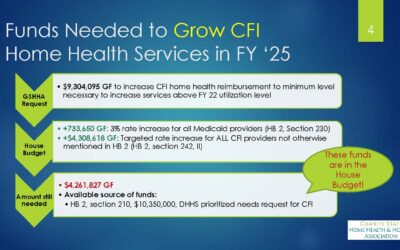Source: Seacoast Online
Their golden years were not supposed to look like this. Karen is living with early onset of Parkinson’s and now has symptoms that require 24-hour assistance. Thankfully, she qualifies for home care through New Hampshire’s Choices for Independence (CFI). Tragically, a critical caregiver shortage caused by a decade of insufficient state investment in home care means she receives a fraction of the help she should.
Ninety percent of her care now falls on the shoulders of her husband, Ron. It is breaking his spirit. He chokes back the tears as he admits that it’s getting overwhelming, but says that he’ll do it every day if he has to.
But he shouldn’t have to. And Karen and Ron are the lucky ones. Many others have no one and are suffering and struggling on their own.
On July 1, the world could look quite different for Karen and Ron and hundreds of other Granite Staters who are older or living with disabilities. That’s when care providers Ascentria and Waypoint, two of New Hampshire’s longest-standing human service agencies, will be forced to close their CFI home care program due to lack of state funding.
For over a decade, these agencies have sounded the alarm, appealing to the state for increased funding in order to provide fair wages to caregivers, but it never came, leaving the financial burden on the shoulders of these nonprofits to try to cover the costs and continue services. But they can’t do it anymore.
According to the New Hampshire Fiscal Policy Institute (NHFPI), the CFI program has had a structural deficit of $153 million from fiscal years 2011 to 2021. Hence, there’s been a mass exodus of caregivers across New Hampshire, who can get paid more, with benefits, by working at McDonald’s.
What’s the impact of a critical caregiver shortage? Right now, seniors and people with disabilities are losing their ability to remain living in their homes; they are going without meals, bathing, medical support, social contact, and, tragically, they are dying alone.
The other side of this equation is the predicament of the caregivers. Ella worked for Ascentria for almost four years. The bond she had with her clients was so strong she continued to care for them despite the financial struggles caused by her low wages. Having to leave them in their time of need was like abandoning family. Paradoxically, caregivers are having to leave the profession to save themselves.
Caregiving isn’t just a vocation, it’s a calling. The work of caregivers is critical to thousands. They provide in-home nursing, homemaking, and personal care, which includes help with bathing, mobility, cleaning, cooking, medical appointments, medication management, household safety, household management, companionship, and more. The work is vital to those who want to remain at home.
Karen and Ron are not alone. There is Kaleb, a young man with muscular dystrophy, who is currently without a caregiver, Earick who is paralyzed and pleading to get his caregiver more money, and Christine with multiple sclerosis who lives in fear of what will happen to her if home care goes away. And, then there are 90-year-old veterans, great-grandmas and grandpas, and retired elementary school teachers, on whose shoulders we stand, just trying to age in place.
You may ask yourself how this affects you if you or a family member don’t need home care. The ripple effect of a caregiver shortage leaves no one unscathed.
If the CFI program collapses:
- Nursing homes don’t have the capacity to accommodate the influx of patients who would be forced to leave their homes. And if they could, it could be at more than double the cost to the community. You pay.
- Hospitals would be log-jammed; they wouldn’t be able to discharge people back home, and thus, if you get sick or hurt, there may be no bed for you. You lose.
- Family members’ lives would be turned upside down. As your own parents become aged, or if you are the parent of an adult with high needs, you would have to leave your job — your livelihood — to provide care. You struggle.
Indeed, we have reached a tipping point and only the state can avert the resulting catastrophe for New Hampshire’s healthcare system. Without a doubt, to underfund this program would not only be fiscally irresponsible, but it would be downright inhumane.
The legislature is in the last phase of the budget process. It is a fact that this year’s budget surplus is higher than ever. The money is there. They need to hear from you right now. Please take 60 seconds and go to CareParadox.org and use the advocacy tool to email your legislators to demand an increase in CFI funding to save home care.
Please stand up for people like Ron and Karen, and hundreds of our neighbors who, without the care they desperately need, will lose their ability to remain in their homes. Don’t let our state turn its back on them.
Borja Alvarez de Toledo is president/CEO of Waypoint. Angela Bovill is president/CEO of Ascentria Care Alliance.


